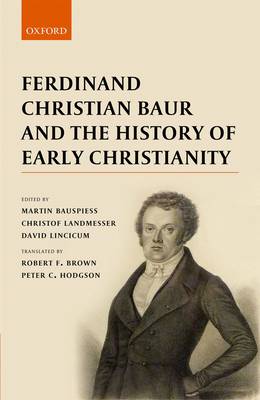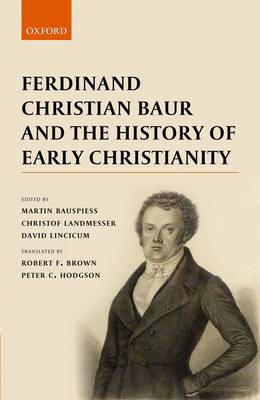
- Retrait gratuit dans votre magasin Club
- 7.000.000 titres dans notre catalogue
- Payer en toute sécurité
- Toujours un magasin près de chez vous
- Retrait gratuit dans votre magasin Club
- 7.000.0000 titres dans notre catalogue
- Payer en toute sécurité
- Toujours un magasin près de chez vous
Ferdinand Christian Baur and the History of Early Christianity
Peter C Hodgson, Robert F Brown
Livre relié | Anglais
265,95 €
+ 531 points
Description
Ferdinand Christian Baur (1792-1860) has been described as "the greatest and at the same time the most controversial theologian in German Protestant theology since Schleiermacher." The controversy was epitomized by a nineteenth-century British critic who wrote that his theory "makes of Christianity a thing of purely natural origin, calls in question the authenticity of all but a few of the New Testament books, and makes the whole collection contain not a harmonious system of divine truth, but a confused mass of merely human and contradictory opinions as to the nature of the Christian religion." The contributors to this volume, however, regard Baur as an epoch-making New Testament scholar whose methods and conclusions, though superseded, have been mostly affirmed during the century and a half since his death. This collection focuses on the history of early Christianity, although as a historian of the church and theology Baur covered the entire field up to own time. He combined the most exacting historical research with a theological interpretation of history influenced by Kant, Schelling, and Hegel. The first three chapters discuss Baur's relation to Strauss, Mohler, and Hegel. Then a central core of chapters considers his historical and exegetical perspectives (Judaism and Hellenism, Gnosticism, New Testament introduction and theology, the Pauline epistles, the Synoptic Gospels, John, the critique of miracle, and the combination of absoluteness and relativity). The final chapters view his influence by analyzing the reception of Baur in Britain, Baur and Harnack, and Baur and practical theology. This work offers a multi-faceted picture of his thinking, which will stimulate contemporary discussion.
Spécifications
Parties prenantes
- Auteur(s) :
- Traducteur(s):
- Editeur:
Contenu
- Nombre de pages :
- 434
- Langue:
- Anglais
Caractéristiques
- EAN:
- 9780198798415
- Date de parution :
- 03-05-17
- Format:
- Livre relié
- Format numérique:
- Genaaid
- Dimensions :
- 157 mm x 234 mm
- Poids :
- 748 g

Les avis
Nous publions uniquement les avis qui respectent les conditions requises. Consultez nos conditions pour les avis.






